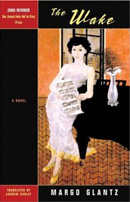
It's been a few weeks since I finished The Wake and I've been thinking about the best way to write this review. How can I do justice to this book that is complex, moving and intellectually challenging?
The story is told by Nora, a well-known cellist, as she remembers attending the funeral of her ex-husband, Juan, a famous pianist. We are with Nora as she moves through the funeral proceedings, the mass, burial and wake. As she goes through these formalities and conversations with acquaintances, Nora's thoughts turn over and over as she tries to come to terms with Juan's death.
The Wake feels very much like listening to a piece of classical music. Ideas are introduced, dropped, and returned to; the same words and expressions are used again and again, as are phrases and themes in a symphony movement. Nora doesn't wail or gnash her teeth, she doesn't talk about her love for Juan or how he hurt her, yet her grief is constantly there, held back only by her constant stream of thoughts.
She is obsessed with the reality of Juan's dead body, on display before being interred, and with the intricate details of heart disease that killed him, trying to understand what a heart represents and what it really is. She recounts Juan's stories about famous musicians and fixates on pieces of music, history, numbers, time and even the story of the castrati. Anything to not think about her loss.
Glantz's style of story-telling is intense. There are no chapters to give the reader a breather and many paragraphs contain thoughts inside thoughts inside thoughts, often using three or four sets of parentheses within a single sentence. I pay tribute to the translator, Andrew Hurley, for rendering these sentences comprehensible and meaningful.
I don't pretend to understand yet the significance of all of the allusions and images in this book. What I do know
is that it is breath-taking and intense, and I'm still thinking about it.

Curbstone Press, paperback, 9781931896238
